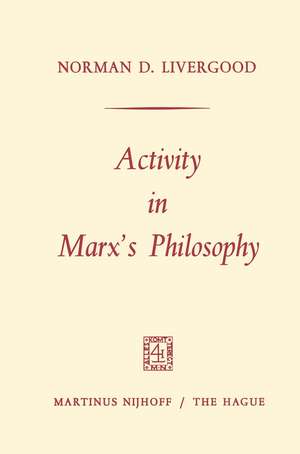Activity in Marx’s Philosophy
Autor Norman D. Livergood Editat de Karl Heinrich Marxen Limba Engleză Paperback – 1967
| Toate formatele și edițiile | Preț | Express |
|---|---|---|
| Paperback (2) | 378.34 lei 43-57 zile | |
| SPRINGER NETHERLANDS – 1967 | 378.34 lei 43-57 zile | |
| SPRINGER NETHERLANDS – 20 apr 2014 | 378.34 lei 43-57 zile |
Preț: 378.34 lei
Nou
Puncte Express: 568
Preț estimativ în valută:
72.40€ • 75.78$ • 60.26£
72.40€ • 75.78$ • 60.26£
Carte tipărită la comandă
Livrare economică 31 martie-14 aprilie
Preluare comenzi: 021 569.72.76
Specificații
ISBN-13: 9789401181679
ISBN-10: 9401181675
Pagini: 124
Ilustrații: XII, 109 p. 2 illus.
Dimensiuni: 155 x 235 x 7 mm
Greutate: 0.19 kg
Ediția:1967
Editura: SPRINGER NETHERLANDS
Colecția Springer
Locul publicării:Dordrecht, Netherlands
ISBN-10: 9401181675
Pagini: 124
Ilustrații: XII, 109 p. 2 illus.
Dimensiuni: 155 x 235 x 7 mm
Greutate: 0.19 kg
Ediția:1967
Editura: SPRINGER NETHERLANDS
Colecția Springer
Locul publicării:Dordrecht, Netherlands
Public țintă
ResearchCuprins
I: Activity and Materialism.- 1. Introduction.- 2. Marx and old Materialism.- 3. Idealism as the Basis of Marx’s Materialism.- 4. Marx’s Criticism of Hegel.- 5. Marx and the Young-Hegelians.- 6. Marx’s Dialectical Materialism.- II: Activity and Knowledge.- 1. Introduction.- 2. Marx and Materialism.- 3. Marx and Idealism.- 4. Marx’s Epistemological Method.- 5. Knowledge as Activity.- 6. Marx and Pragmatism.- III: Activity and Philosophy.- 1. Introduction.- 2. Hegel’s Theory of the State.- 3. Marx’s Diagnosis of the State.- 4. The Cure of Society.- IV: Summary and Evaluation.- 1. Materialism.- 2. Epistemology.- 3. Philosophy.- 4. Evaluation.- An English Translation of Marx’s Doctoral Dissertation.- The Difference Between the Democritean and Epicurean Philosophy of Nature.- Foreword.- One: the Difference Between the Democritean and Epicurean Philosophy of Nature in General.- I. The Subject of the Treatise.- II. Judgments Concerning the Relationship of Democritean and Epicurean Physics.- III. Difficulties with Regard to the Identity of the Democritean and Epicurean Philosophy of Nature.- Two: on the Difference Between the Democritean and Epicurean Physics in Detail.- I. The Declination of Atoms from a Straight Line.- II. The Qualities of the Atom.- III. Atomoi Archai and Atoma Stoicheia.- IV. Time.- V. The Meteors.













